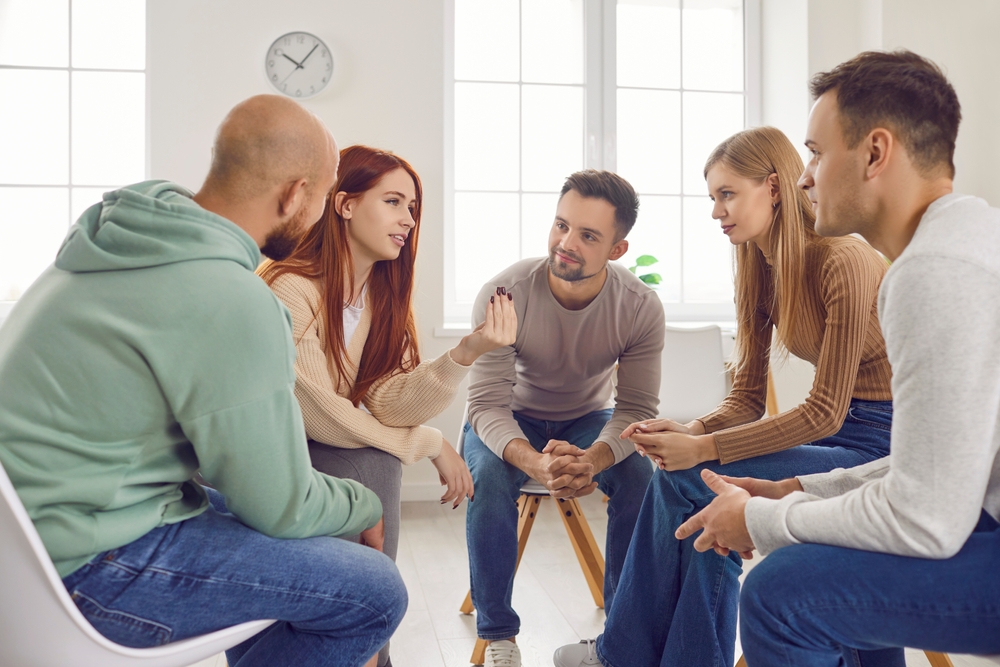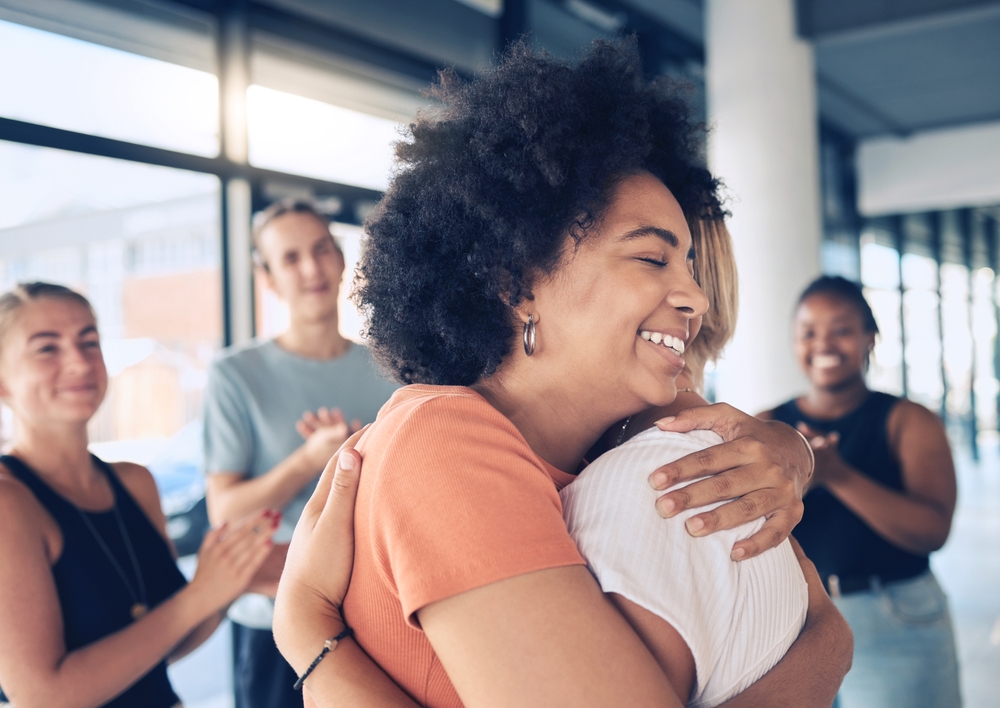Last Updated:
September 10th, 2025
Group Therapy | Addiction Treatment Therapies
Addiction has a way of isolating you, creating a distance between you and the people around you, especially those you love the most. The loneliness can push you even deeper into addiction, with drugs, alcohol or addictive behaviours becoming a way to forget how alone you feel. Group therapy addiction treatment changes all that, bringing you into a circle of people who have faced the same battles and can understand what you are going through without you even having to explain. By opening up, listening and sharing, you can find community and compassion, which are key ingredients for lasting recovery.
What is group therapy for addiction?
Everyone knows the classic scenes from films and television where a character stands up in an AA meeting and says, “Hi, I’m John, and I’m an alcoholic.” That can seem like a scary thing to do but real group therapy addiction treatment is a lot different.
Group therapy means joining a circle of peers, either in rehab or a local support group, to talk openly about your addiction history, challenges and feelings. These sessions are guided by a professional therapist and allow you to share your story, listen to others and learn together in a space that’s safe and judgment-free.
How group therapy works in addiction treatment
Group therapy for addiction is central to many rehab programmes. It is your chance to build genuine connections with people you don’t yet know but who can probably understand your situation better than even your closest friends and family. Just meeting other people who nod along with what you’re saying or who talk about similar experiences to yours can be a big eye-opener and show you that you’re not on your own.
Group therapy sessions are carefully structured, ensuring everyone gets the chance to talk about different aspects of the addiction journey, from fears to daily challenges to moments you’re proud of.
One amazing thing about group therapy addiction treatment is seeing people at different points in their recovery journey all in one place. You will meet people just coming to terms with their addiction, others actively making positive changes and some who’ve overcome tough obstacles and are thriving. Hearing these different experiences can give you fresh hope, insights and motivation, reminding you that progress is real and possible.
Struggling with an addiction? If you are ready to seek help, reach out to us today, and a member of our compassionate team will help you find the best option for starting your recovery journey.
What to expect in group therapy for addiction
It is completely normal to feel nervous about attending your first group therapy session but knowing what happens can make it less intimidating. These sessions are carefully set up so you always feel comfortable, supported and able to speak openly without feeling forced.
At the beginning, you will usually have a quick check-in, giving everyone a moment to share how they’re feeling and anything that’s bothering them. The main part of the session is then about talking openly together and sharing your experiences, struggles and successes in recovery. You may discuss specific topics like managing cravings, dealing with tough emotions or rebuilding relationships.
Towards the end, the therapist will usually wrap things up by asking everyone what stood out to them or what they found helpful during the session. The aim is for you to walk out feeling encouraged, supported and ready to face the day or week ahead.
What are the benefits of group therapy for addiction?
There are some really powerful benefits of group therapy for addiction that can hugely support your addiction recovery. Here is what group sessions can offer you:
NHS vs private group therapy for addiction
Group therapy is a core part of addiction treatment, whether you go through the NHS or a private rehab programme. But there are some important differences that can impact your recovery.
With the NHS, group therapy for addiction is usually the main form of support offered because individual sessions are often limited or not available. While group therapy is powerful on its own, it tends to work even better when paired with one-to-one sessions. These private sessions allow you to dive deeper into your personal challenges, explore things you may not feel ready to share in a group yet and get tailored support from your therapist.
Another big difference is accessibility. NHS addiction services are free but because so many people need help, waiting lists can be long. This means it may take a while to join a therapy group or start your treatment. On the other hand, private group therapy for addiction is part of a comprehensive rehab programme you pay for. This means you will start right away without delays and you will also receive other therapies and support as part of the package.
Private rehab also means you will be living alongside the same people you share group therapy sessions with. Getting to know each other outside sessions helps create a more relaxed atmosphere, making you more comfortable talking honestly about difficult topics.
How to find group therapy for addiction recovery near me
If you are looking at group therapy addiction treatment options but can’t find the best fit, Addiction Helper is here to support you. Contact us today and we will guide you through every step.
Our compassionate team are ready and available to take your call, and guide you towards lasting the lasting addiction recovery you deserve.
Frequently Asked Questions
(Click here to see works cited)
- Oasis Bradford. “Group therapy | Addiction treatment & recovery.” Oasis Bradford, 10 March 2025, https://www.oasisrecovery.org.uk/rehab-programme/group-therapy/. Accessed 24 June 2025.
- Recovery Lighthouse. “Group Therapy | Addiction Treatment Therapies.” Recovery Lighthouse, 10 March 2025, https://www.recoverylighthouse.com/rehab-treatment/therapies/group-therapy/. Accessed 24 June 2025.
- Smith, Danny. “Group Therapy | Therapies for Addiction Treatment.” Linwood House, 10 April 2025, https://www.linwoodhouse.co.uk/rehab-treatment/addiction-therapies/group-therapy/. Accessed 24 June 2025.
- UK Rehab. “Group Therapy | Rehab Therapies and Models.” UK Rehab, https://www.uk-rehab.com/rehab-therapies/group-therapy/. Accessed 24 June 2025.



